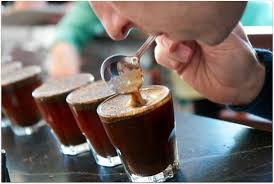Cupping Notes: Fragrances, Acid, Body, Flavor and Finish

As a follow up to our cupping guide, here's a handy guide for distinguishing between coffee characteristics — which, for the novice cupper, can sometimes seem like five ways to say the same thing.
Here are a few more tips for advancing your cupping skills by sorting out dry grounds from wet, and distinguishing aspects of acidity, body, flavor and finish.
Fragrance of dry coffee grounds
Do they smell fresh? Stale? Over roasted? Under roasted? This is a great place to find out, before water is added to the mix.
Examples:
Sweet Spicy
Roasty Nutty
Malty Carbony
Stale Fresh
Fragrance of Wet Grounds
When the grounds are wet, they emit aroma. Water mixing with the coffee and oxygen produce a more intense smell than with the dry grounds.
Examples
Smooth Fresh
Lively Creamy
Sharp
Acidity
Acidity can be a desirable attribute in coffee (when it’s lively and fresh), or an unwelcome one (when it’s sour). But make no mistake: coffee devoid of acidity is flat an lifeless. Yet coffee with too much or the wrong type of acidity can be hard to swallow. If the acidity is unpleasant, pleasant, fresh, sour, or what have you – jot it down in your cupping notes.
Examples
Nippy Neutral
Soft Tangy
Tart Rough
Mild Delicate
Smooth Winey
Body
This is a description of the richness and fullness of the feel of the coffee in your mouth.
Examples
Full Rich
Fat Thin
Flavor
This is the fun part. Is there chocolate? Fruit? How much depth do the flavors have?
Examples
Fruity Winey
Buttery Caramel
Chocolate Blackcurrant
Woody Grassy
Honey Liquorice
Malty Nutty
Spicy (and what kind of spice?)
Finish
After you’ve swallowed or spit out the coffee, what are you left with? Aftertaste is an important part of the cup. It’s what lingers, what you remember about the coffee.
Examples
Sweet Smooth
Sour Full
Bitter Silky
Sharp Burnt
Dry


